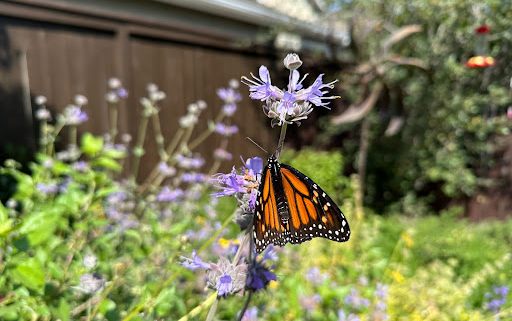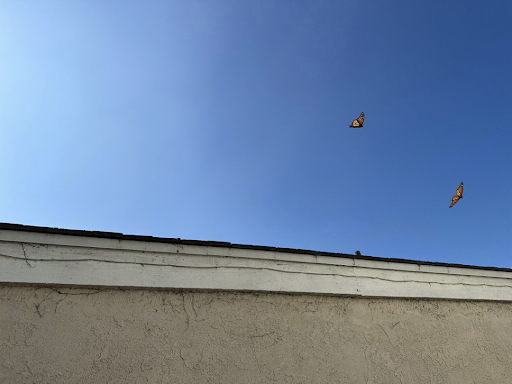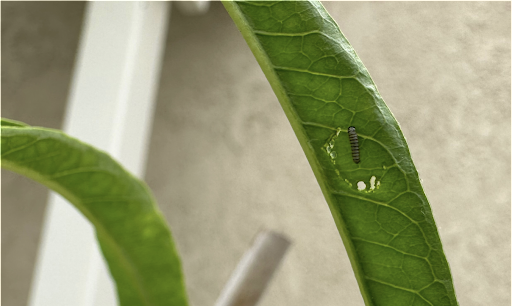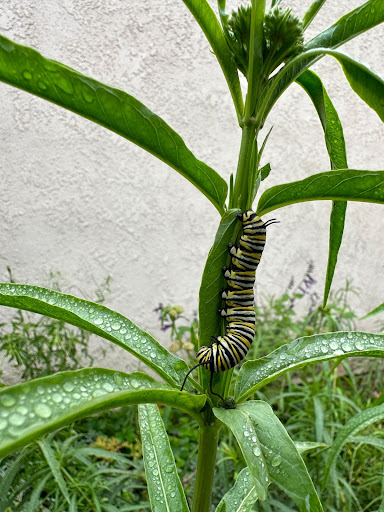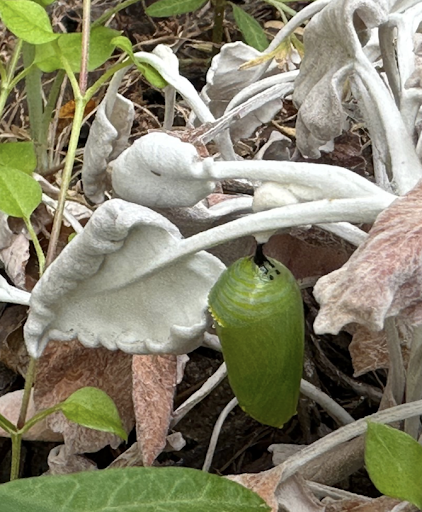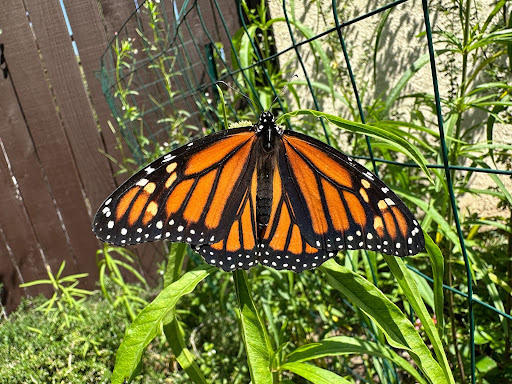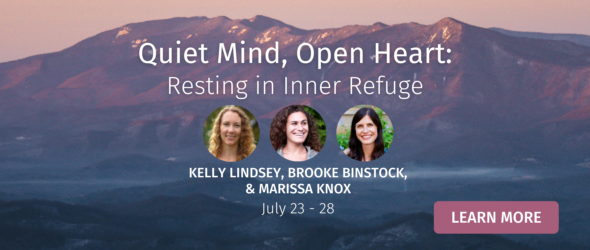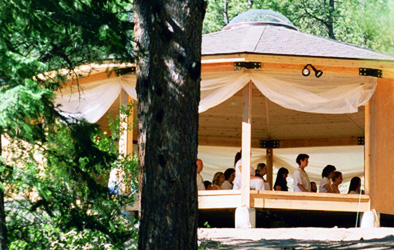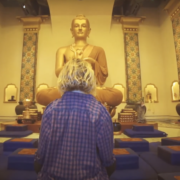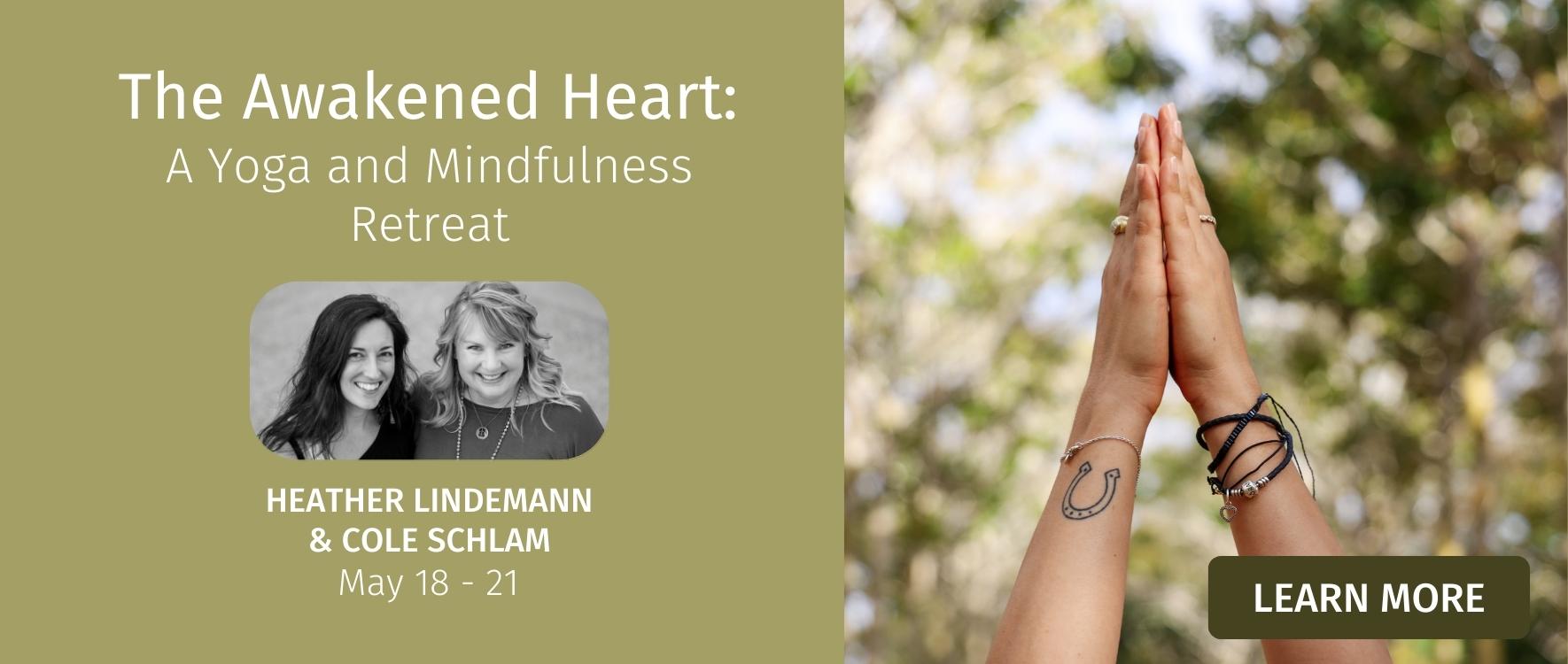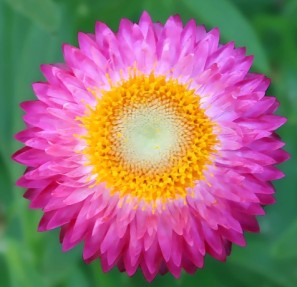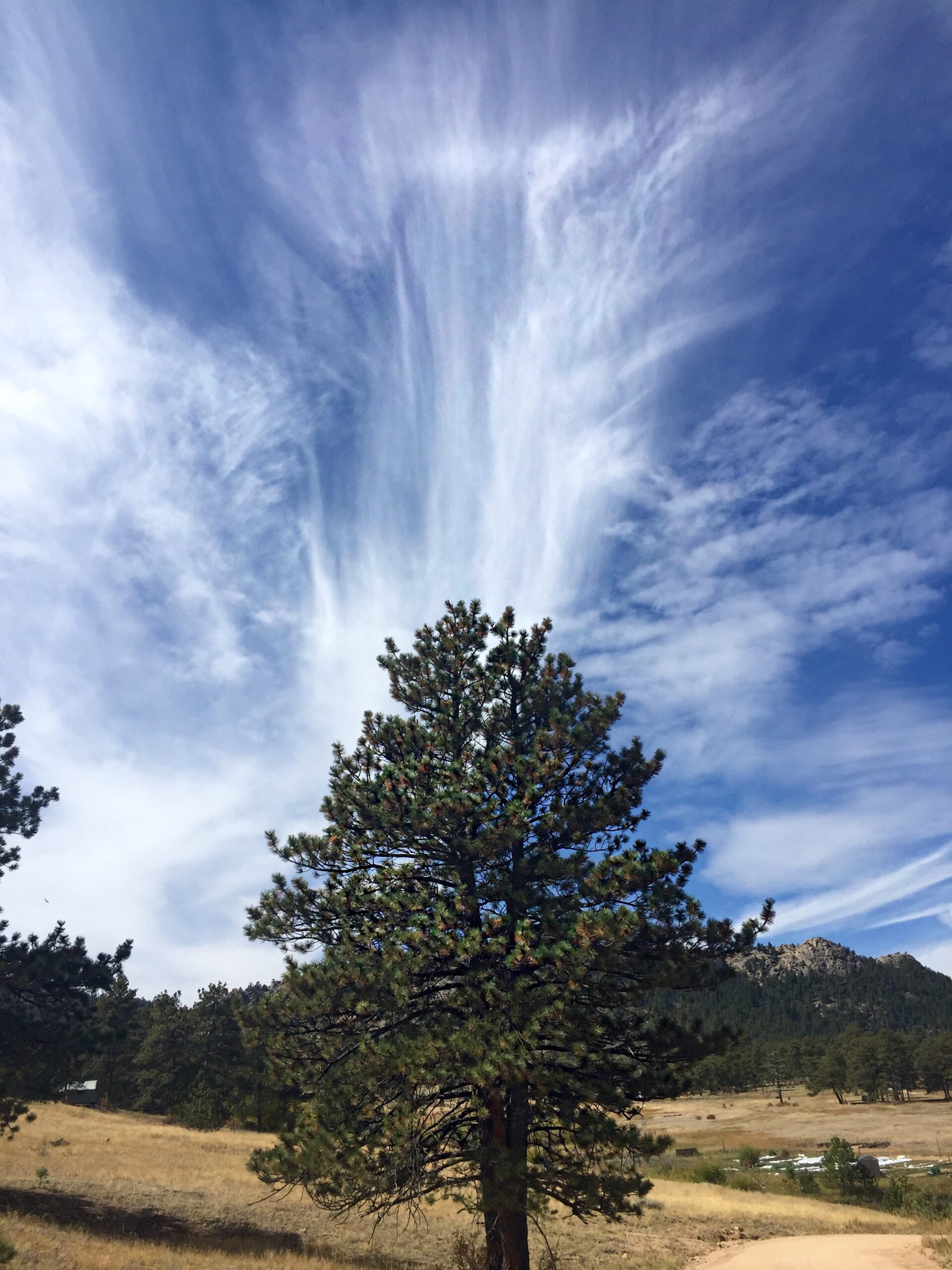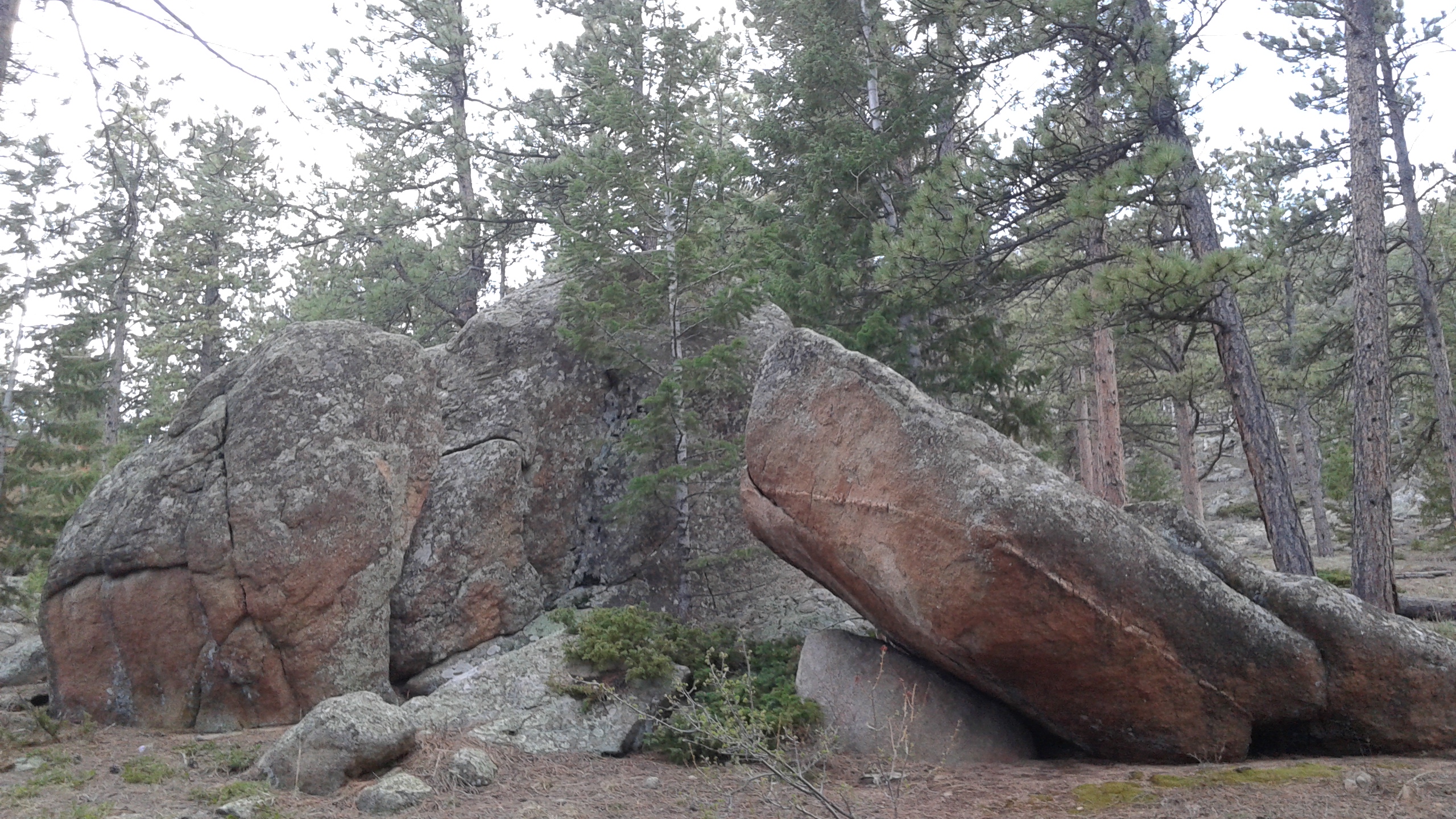Embracing the Chrysalis
By Marissa C. Knox (all photos by Marissa C. Knox)
When I seek refuge, I almost always find my way to a place in nature. In the company of tall trees, small flowers, or mossy rocks by a river, I feel held by the expanse of beauty and divine energy around me. In the fresh air, I can feel my body unclench, the tension behind my eyes soften, and the nourishment of deep rest wash over me. Often I look for refuge in places far away from home, where there is only sky and earth and open, light-filled space. Yet, this summer, monarch caterpillars and butterflies taught me an important lesson about looking for refuge in my own backyard, trusting the inner silence, and looking within for nourishment.
I spent the last three weeks visiting family and staying in my childhood home. In the backyard, my parents have cultivated a sanctuary for plants and animals. In particular, my dad loves to garden and has planted milkweed throughout the yard to attract monarchs and give them a place to fulfill their life cycle.
During my visit, I went into the backyard each morning and opened myself to the dance of life. Glowing orange poppies unfurled their sunlit petals, revealing the grace of a new day. Rosemary bushes and purple blooms from Cleveland sage offered their nectar to enthusiastic bees. Hummingbirds zipped through the air before landing silently to sip the sugar water. The flutter of monarchs left me almost dizzy as they flickered in all directions – my eyes following them up to the bright blue sky, over to the roses, up to the pine tree, and back around to the oak tree. Wherever my head turned, my attention was captivated by their unpredictable flash of orange and black wings, luminous like stained glass windows.
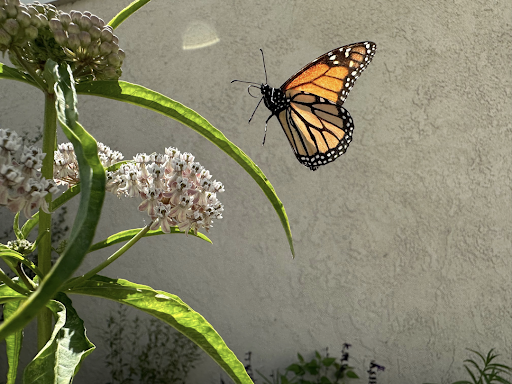
I became mesmerized by all the stages of a monarch’s life cycle. My fascination started with the delight of witnessing two butterflies in the midst of courtship. They moved in circles around me, and I could hear the flap of their translucent wings as they darted into one another, sensing their pheromones. A female monarch flitted through the garden the next day, pausing on milkweed leaves to lay eggs. I spotted one egg on a leaf, a tiny white dot. This is where the miracle begins. As I crouched to search for more eggs, I found two recently hatched caterpillars beginning their feast on milkweed, one nearly imperceptible bite at a time.

I would spend hours savoring the joy of seeing leaves disappear into the mouths of plump caterpillars visibly chomping away. Each bite helped them grow closer to their future selves. Day after day, I blissfully immersed myself in the flourish of activity in the backyard, getting to know the caterpillars’ favorite spots to nosh and rest in the shade.
As the days passed, I spotted full-grown caterpillars hanging upside down in the shape of a J, gently quivering as they prepared to pupate. Within hours, I returned to where I once saw a caterpillar and instead found a shimmering green and gold chrysalis. The bustle of the yellow, black, and white caterpillars munching and inching their rotund bodies throughout the garden slowly faded as more green jewels of possibility were strung on low branches.
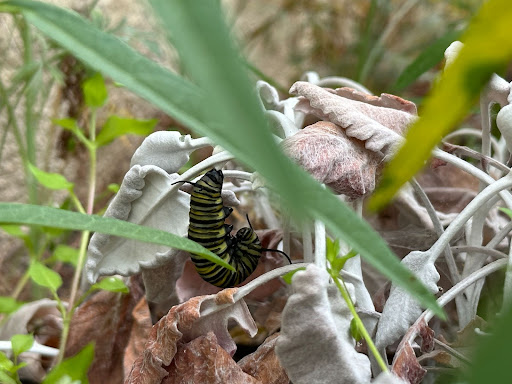
Each day I counted fewer caterpillars. Soon I felt all alone in the backyard as the caterpillars vanished, and I was left surrounded by the lull of inactivity. Despite knowing a powerful metamorphosis is occurring within a chrysalis, I felt uncomfortable waiting for the change. Every morning and afternoon, I eagerly checked on the few chrysalises I could see and wondered if they were ready yet. After several days, I finally saw the outlines of wings appear under the outer layer of a chrysalis. “This is it!” I hoped. Yet the chrysalis remained that way for over a week. I felt an urgency that was incompatible with their dormancy.
My impatience felt all too familiar. In my own phases of growth and transition, I often want to rush through periods of rest and slowness. I resent myself for being “unproductive” and feel anxious about piling lists of things I should do. I sabotage the restorative quality of these moments by resisting the necessary pace of transformation. I was repeating this same pattern of restlessness with the chrysalises.
Instead of feeling stuck waiting for the chrysalis to change into something more desirable, I felt a potent invitation to take the shape of my own chrysalis at this time in my life and to embrace the possibility, mystery, and creativity available. Here I get to ask myself: Who do I want to become? In my process of becoming, how can I appreciate being who I already am?
Whatever phase you find yourself in, resting in a space of inner refuge is empowering. It is a space where we are both the caterpillar and the butterfly. We are both changing and changeable. We are both being and becoming – whole and complete with all we need to unfold into the next moment.
Embracing the chrysalis of our inner refuge will be the focus of our annual Quiet Mind, Open Heart retreat this summer. As Brooke and Kelly have already shared, we hope this retreat will allow you to honor your experience and tend to your body, mind, heart, and spirit. Through the support of nature, contemplative practice, gentle yoga, and meaningful time in community, you will return to your daily life after this retreat with renewed energy and greater access to your inner resources. Please join us and take refuge in the beauty of Drala Mountain Center and experience the restoration of retreat.
In preparation for our time together, I invite you to take a few deep, slow breaths while moving your arms like butterfly wings. Inhale as you bring your arms overhead, stretching the sides of your body. Exhale as your arms float down to your sides, lengthening your spine as the crown of your head reaches toward the sky. Try this 3 – 5 times to reset your energy and feel the joy of being like a butterfly.
Join Marissa Knox, Kelly Lindsey and Brooke Binstock this summer!
About Marissa Knox


